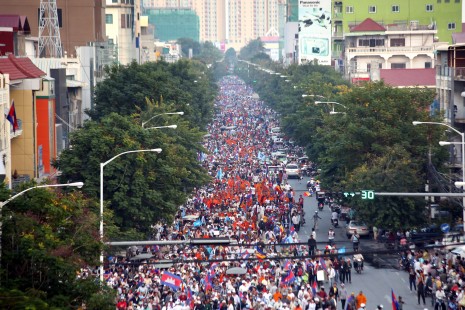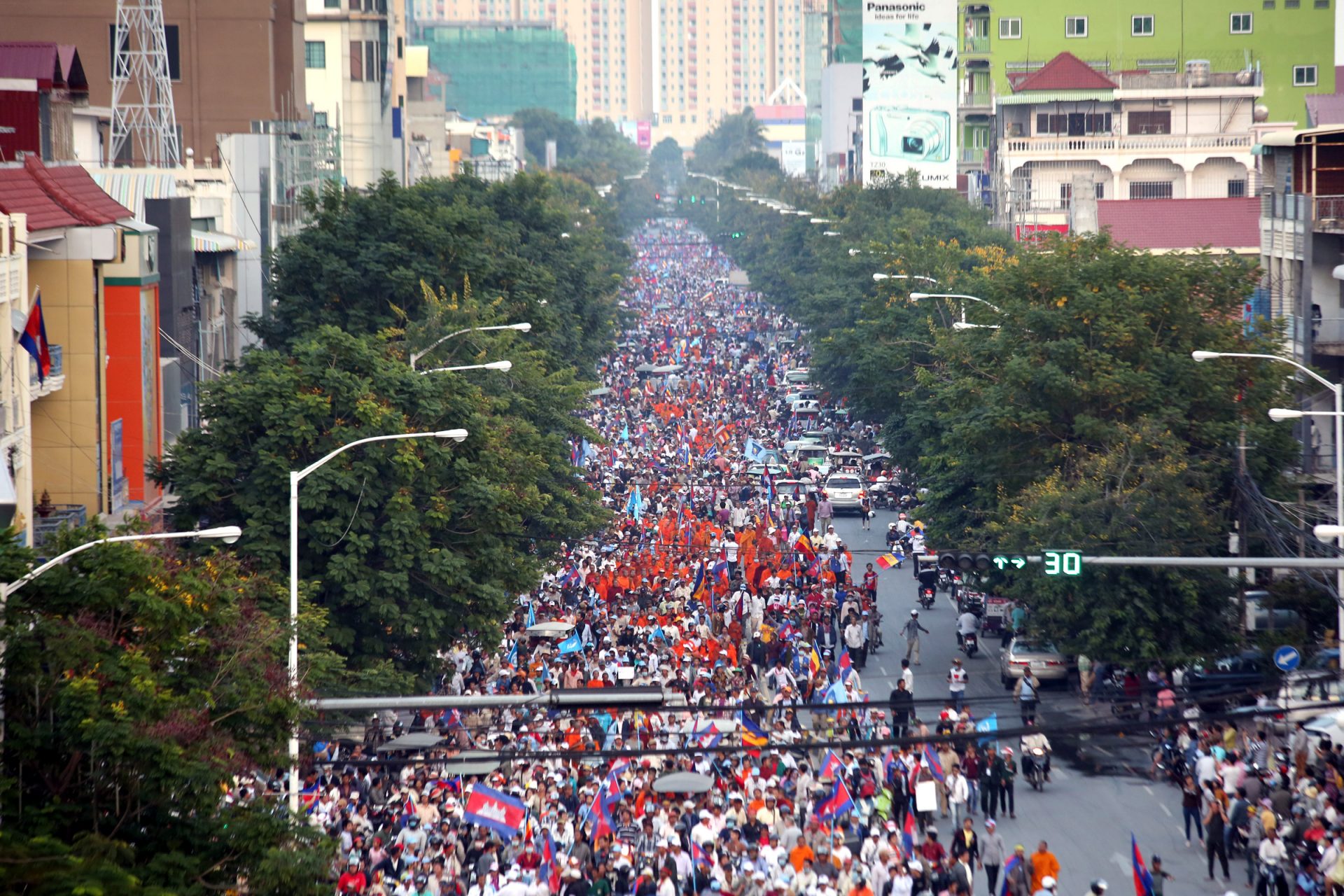An estimated 30,000 opposition supporters gathered in Freedom Park and walked Phnom Penh’s streets Sunday calling for the resignation of Prime Minister Hun Sen, the largest march staged against the CPP leader since similar mass protests following the disputed election in 1998.
Sunday’s march marked the eighth consecutive day of opposition rallies in Phnom Penh against Mr. Hun Sen, who told reporters on Friday that he had no intention of resigning or holding a new election before the end of his five-year mandate, as the opposition CNRP is demanding.

The hourslong parade of more than 20,000 chanting, flag-waving demonstrators stretched for kilometers down Monivong Boulevard before the marchers turned onto Mao Tse Toung Boulevard, north at Street 163, walked around Olympic Stadium and east down Charles de Gaulle Boulevard before returning to their home base, Freedom Park, where several thousand more demonstrators awaited their return.
CNRP President Sam Rainsy told the crowd during the march, which lasted from 2:30 p.m. to 7 p.m., that more than half a million CNRP supporters were out on the streets. City Hall spokesman Long Dimanche put the figure at more than 10,000.
The march came to a 20-minute halt near the intersection of
Monivong and Sihanouk boulevards at about 4 p.m., when Mr. Rainsy and his deputy, Kem Sokha, invited supporters to stand atop their pickup truck and explain, over loudspeakers, what the prime minister had done to deserve their calls for his resignation.
As part of his explanation for why he wouldn’t step down, Mr. Hun Sen said on Friday that he hadn’t done anything wrong during his two decades as leader of the country.
“Prime Minister Hun Sen has sold our land and cultural heritage,” said one woman. “Our mineral resources and forests have been sold, so what will Cambodia’s future look like?”
Another woman complained that the minimum wage set by the government was not enough to support her family.
“I get $80 per month and I spend it on my utilities and $20 is left to send to my family,” she said. “Now we ask the government to provide $150. If they cannot provide it, why shouldn’t he step down?”
A graduate of the National University of Management complained of unemployment in the country.
“I finished university but I cannot find a job to do. The rich and powerful people can easily get a job because they have connections,” she said.
Another garment factory worker raised the case of Chhouk Bundith, the former governor of Bavet City who shot three protesting workers and who still remains at large, as an example of the impunity allowed by Mr. Hun Sen’s government.
“Our workers were shot by authorities…. We asked the prime minister to find justice for us but he does not care. Therefore, we need Hun Sen to step down,” she said.
Addressing the crowd, Mr. Sokha suggested that if Mr. Hun Sen was still unable to hear the demonstrator’s reasons for demanding his removal, the CNRP could bring future protests closer to his house at Independence Monument.
“This time we had lines stretching from both sides of Monivong Boulevard, but next time we might be somewhere closer,” he told supporters.
“Did you hear us or not?” Mr. Sokha asked, referring to Mr. Hun Sen. “If not, should we go closer to his house so he will hear us?” he asked the crowd.
“If you do hear us, come to talk with the leaders of the demonstration about whether or not you agree to a re-election,” he added.
Walking in front of Mr. Rainsy and Mr. Sokha during the march were hundreds of monks, who turned out despite Phnom Penh governor Pa Socheatvong’s warning, delivered at Wat Lanka on Thursday, that monks who participate in political protests risk losing their right to vote.
The rally was boosted by the presence of thousands of garment factory workers—many affiliated with the Coalition of Cambodian Apparel Workers Democratic Union—who joined the march on their day off.
Mr. Rainsy and Mr. Sokha reiterated the CNRP’s pledge to raise the monthly minimum wage to $150 from the current $80. The government last week proposed raising the minimum wage to $160 by 2018, when the next national election is scheduled to be held.
Staggered throughout the march Sunday were several women, equipped with microphones and loudspeakers and sitting atop cars and tuk-tuks, who led the crowd in chants of “Hun Sen get out!” and “Change!” as they snaked through the city.
Spectators lined the streets and poured out onto their balconies, many taking videos on their smartphones and joining in the chanting, as the march moved past.
As with protests last week, the only security presence along the route was an occasional group of traffic police standing at intersections, helping to ease the traffic congestion.
Addressing the crowd back at Freedom Park at about 7:30 p.m., Mr. Sokha said that Mr. Hun Sen’s argument that there was no stipulation in the Constitution that allows the prime minister to dissolve parliament was “nonsense.”
“Do not say that there is no law that allows a re-election,” Mr. Sokha said.
“You [Mr. Hun Sen] are speaking nonsense. The law is created for the people and now the people are asking for a re-election,” he said.
Mr. Rainsy said that opposition demonstrations would continue at the park throughout this week, and promised that demonstrations next weekend would be even larger if the government does not meet the CNRP’s demands for a new election or an investigation of July’s election.
“Next week, the number [of demonstrators] will be double this, and we will let the demonstrators decide what they should do,” he said.
“You cannot prevent it,” Mr. Rainsy said.
“The government has one week to think about this and solve the problem.”




